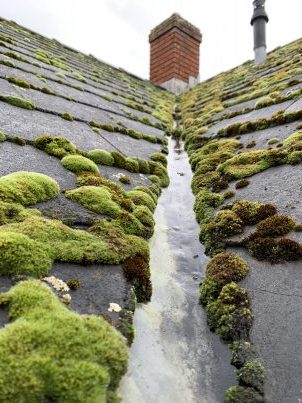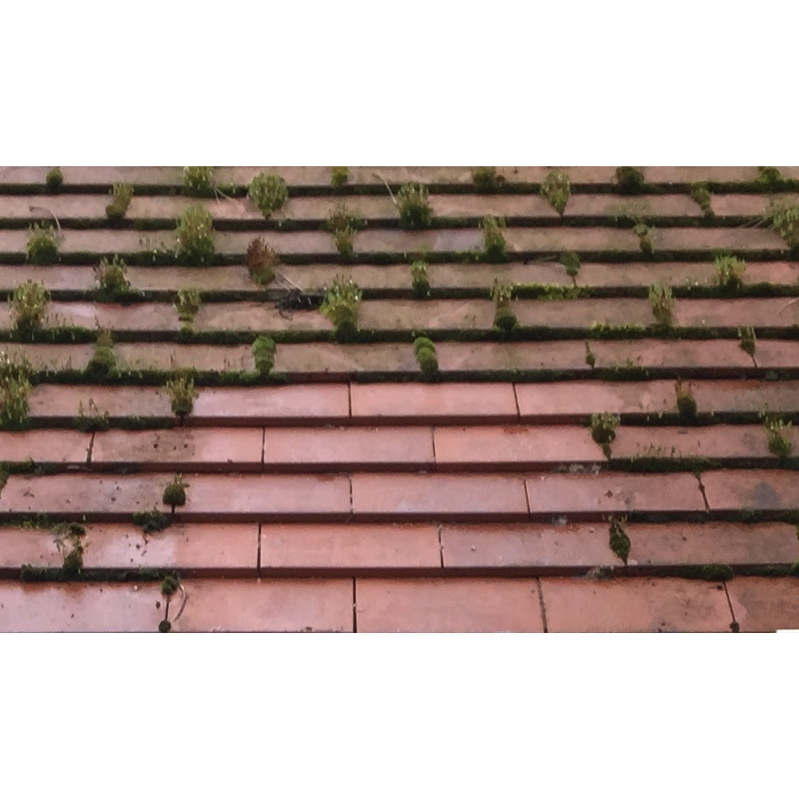What is moss and why does it grow?
Why does moss grow on roofs? Mosses are found throughout the UK and are different to many flowing plants as they produce spores. They need damp conditions to grow and for reproduction and thrive in this environment. The reason they need damp conditions is because the male cells need to be able to move via a film of water to reach the female cells for fertilisation. Sometimes this can occur within one plant. However, sometimes it can also require them to reach another plant. But this depends on the species. So, should you remove moss from a roof?
Mosses are important when it comes to colonising bare ground. This is because they will absorb large quantities of water, helping to create a humid environment. This is great when it comes to areas such as forests and other wild areas. However, this is can be very damaging when it comes to your roof.

Several types of moss
Common haircap (Polytrichum commune)
Silky forklet moss (Dicranella heteromalla)
Swan’s-neck thyme moss (Mnium hornum)
Common tamarisk moss (Thuidium tamariscinum)
Glittering wood moss (Hylocomium splendens)
Springy turf moss (Rhytidiadelphus squarrosus)
Sphagnum species
As the UK has a wet climate moss thrives. So should you remove moss from a roof?
Moss on roof tiles can cause big problems such as blocked drainage systems and water ingress. Moss growth on a roof can result in costly repairs being needed, and also reduce the lifespan of your roof. To remove moss from your roof tiles will often require employing a professional contractor. As roof cleaning means working at height. It is important to choose an experienced, insured and a safe contractor.

Moss on Roof Tiles: Is it a problem?
Is moss on roof tiles a problem? Most roofs will experience moss or lichen growth, and small patches of growth are usually not a problem. If the moss growth is allowed to develop further, it can become a problem for the roof for a number of reasons:
- Moss absorbs water and acts like a sponge. This means your roof will be constantly wet. If this moisture works its way underneath the tiles it can lead to your woodwork on your roof becoming rotten. This can cause major problems and lead to costly repairs and safety concerns regarding the structural integrity of your house.
- Sloped roofs are designed to divert rain water into gutters and away to drains. If moss grows on the tiles and slates it will fall off, into the gutters. This will prevent adequate drainage and lead to blockages. This can lead to repairs being needed and water to work its way into the roof space.
How do I remove moss from my roof tiles?
To avoid costly repairs, moss should be removed from your roof tiles quickly. Usually it is best to avoid pressure washing your roof to remove moss. High pressure can cause damage to the tiles and lead to water getting into your roof.
Many people will wonder how to remove moss from a roof naturally. When they see moss on clay roof tiles, concrete or slate, many will try to find how to remove moss from a roof without chemicals. This can be done by gently brushing the moss from the roof or scraping the moss from the roof tiles. The issue with using no chemicals is that the moss is not killed in the process. This means that moss spores on the roof that have not been removed will grow back relatively quickly. Even if homemade moss killer for roofs is used the results are usually limited.
How can I prevent moss from growing on my roof tiles?
In theory you can prevent moss from growing on your roof by having copper ridges installed to your roof. When it rains, the rain will run over the ridges and a coppery residue is released. This will run down the roof, discouraging moss growth. However, experience has shown that this will usually only work for a few feet under the copper ridge. This means several copper ridges are needed. This can be costly, but also be a target for opportunists that may steal the valuable metal from your roof.
Regular maintenance and cleaning is the best option to prevent moss growing on your roof. If you have moss growth on your roof it Is best to have a thorough clean first by a contractor. Then, an annual application of a biocide will keep the moss at bay.
Beware of DIY roof cleaning
If you decide to remove the moss on your roof yourself, think about the dangers of working at height, on your roof. Working at height without the correct training, experience and equipment can lead to serious injuries, or death. Also, cleaning in a way that is not bets for the roof can lead to damage and costly repair bills.
Leeksons Exterior Cleaning offer roof cleaning services throughout South Wales and the South West. With over 20 years experience we have cleaned many roofs. Most of the time we are able to clean your roof without setting foot on it. By using out specialists tools we are able to scrape the moss growth from a mobile scaffold tower. This means a safe working platform for our operatives. We also have safe ways of applying biocides that will prevent the regrowth of mosses. If you have been searching for “roof moss removal near me” then get in touch with us to arrange your free quotation.
